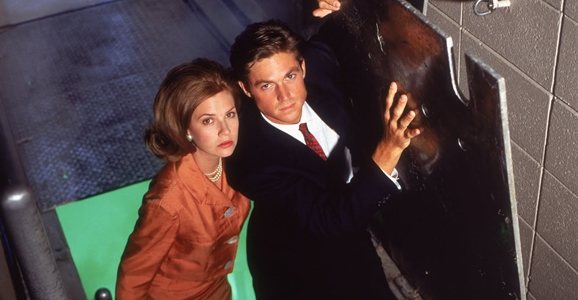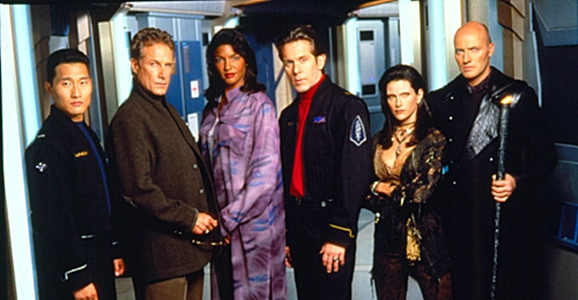Six Sci-Fi Shows That Deserve A Do-Over
These ideas deserved better than they got.
This article is more than 2 years old
With the middling, J.J. Abrams-produced Alcatraz hitting Blu-ray and DVD this past week, it’s occurred to me that there are a lot of science fiction shows out there that just plain need a do-over. I don’t mean a show like Firefly, which was short-lived, sure, but which is also a damn near perfect run of television. It may have only shot 14 episodes, but it knocked those 14 out of the park so hard that it spawned a movie and a fanbase that’s just as a passionate a decade later. No, I’m talking about shows that had potential but got a raw deal. Maybe it was a case of wrong time, wrong network. Maybe the suits with the purse strings poked and prodded till all the life was drained out of the premise. Maybe it just didn’t get enough time to find its footing.
This is a look back at the shows that, to borrow a line from Superman’s dad, “coulda been a contender.” I’ve picked out six shows that still irk me when I think about them. Shows that had a great premise or an amazing cast or even just that certain indefinable something that meant you could sense that the show was just waiting to catch fire. To clarify, I’m not suggesting these need a reboot, although that could be worthwhile in some cases. I’m just saying that these shows deserved better than they got. And some of them didn’t even air on Fox! (I’m also specifically focusing on short-lived shows, so that counts out shows like Enterprise, which I think had the potential to be better than it was, but which still lasted four seasons.)

Max Headroom (1987 – 1988)
Of all the shows on this list, this is one I think has the most potential for an outright reboot. While the show obviously looks dated, it’s amazing how ahead of its time the show’s style and ideas were. And let’s face it, outside of the sort of people who read Giant Freakin’ Robot, most TV viewers out there are either too young to have ever heard of Max Headroom, or only remember him as the annoying Coke pitchman. Originally based on a British TV pilot, the short-lived Max Headroom series was a pitch-black slice of cyberpunk satire back when the genre was virtually untouched by television. It starred Matt Frewer as Edison Carter, an investigative journalist in a dystopian future effectively ruled by television networks. After he’s killed in a motorcycle crash, a copy of his brain is uploaded into a computer and thus is born “Max Headroom” (so named for the vehicle-clearance warning he sees before he dies…it had that sort of sense of humor).
Honestly, you don’t even have to hear much more than the show’s logline to see how Max Headroom is, if anything, even more timely now than it was during the ‘80s. The media landscape has expanded to countless channels competing for viewers’ eyeballs. Reality television continually redefines the lowest common denominator. The show’s cynical gaze would find no shortage of targets, from social media to emergent artificial intelligence to our society’s unhealthy fascination with being famous as a goal rather than a byproduct of actually doing something noteworthy. In the right hands, Max Headroom could play like a bastard child of South Park and Warren Ellis’ back-catalog, mercilessly butchering every preposterous corner of our culture while also spinning tales of the crazy fringe science that is blurring the boundaries of fiction and fact.
You can pick up the original Max Headroom series on DVD right here.

Space: Above and Beyond (1995 – 1996)
This is one that I don’t think I’d champion for a reboot simply because the cast was so great at the time. Created by X-Files wunderkinds Glen Morgan and James Wong, Space: Above and Beyond followed the men and women of the “Wildcards,” otherwise known as the United States Marine Corps Space Aviator Cavalry, 58th Squadron. They serve as both infantry and spacefighter pilots in humanity’s war against the insectile “Chigs,” a species that came out of nowhere to attack mankind’s first extra-solar colony world. The top-notch cast included genre veterans such as Kristen Cloke (Millennium, Final Destination) and James Morrison (Quantum Leap, The X-Files), but honestly there wasn’t a weak link in the entire cast, and it actually helped the show’s veracity that most of them weren’t recognizable faces.
While the concept of a “military space campaign” is hardly original, Morgan and Wong still found ways to tell fresh and interesting stories, and the world is one I would have loved to explore more, a world of vat-grown “in vitro” humans and rebellious A.I. “silicates” who collaborate with the Chigs against their creators. To this day, some 16 years later, the almost dialogue-free “Who Monitors the Birds?” is still one of the best hours of science fiction television I’ve ever seen. And while part of me feels that the show’s time has come and gone, and certainly Morgan and Wong have moved on to many other things, I think about the fact that the show’s creators purportedly planned for a five-season run, and man…I would have liked to see what those other four years had to offer.
You can pick up Space: Above and Beyond on DVD right here. And a bright light at the end of this tunnel: Spartacus: Blood and Sand creator Steven S. DeKnight is working on Incursion, a military SF series for Starz that sounds like it could become the show Space: Above and Beyond might have if given time.

Dark Skies (1996 – 1997)
Back in the ‘90s when everybody was desperate to capture a little bit of that X-Files magic, somebody thought, “Hey, what if we made The X-Files but set it during the ‘60s?” Okay, that’s dismissive, because I think that simple idea of shifting the “UFO investigator” concept to a different era made for a very different show, and it’s a concept still ripe with potential. Dark Skies was the baby of Bryce Zabel and Brent V. Friedman, and while it definitely developed a following, it never really emerged from the shadow of the X-Files comparisons and died after one season on NBC.
And that’s a real shame, because when you think about it, setting an X-Files style show in the 1960s actually makes more sense than setting it in the 1990s. That placed it square in the middle of an era rife with conspiracies both real and imagined, weaving its stories of alien invaders around real-life historical figures and tragedies in a time when American trust of its government was on the wane. The X-Files sketched out a labyrinthine, decades-old history of conspiracy via flashbacks, but Dark Skies tried to set up camp in that world rather than just using it as background. With so many different networks getting into the business of original content, with period-set shows such as Mad Men and Magic City becoming hits, and with “respectable” networks embracing genre content (HBO’s A Game of Thrones, AMC’s The Walking Dead), I think a Dark Skies reboot could be something special. And with Fringe bowing out this season, we’re going to be in dire need of a new “new X-Files.”
You can pick up the complete set of Dark Skies on DVD right here.

Crusade (1999)
Of all the shows on this list, Crusade is the one that pains me most to write about. As a ground-floor fan of Babylon 5, that series is still one of my favorite genre shows of all time. I admired and respected J. Michael’s Straczynski’s decision to keep that series limited to the five seasons he had always imagined, but man, 1999-era me was also giddy at the prospect of more from the B5 universe and the mind of JMS. And like so many other fans, I watched with a mixture of dismay and morbid fascination as Crusade was “networked” to death by a meddlesome TNT, resulting in what I still consider one of the most tragic and wasteful fates for a science fiction series.
Even aside from the fact that it was from JMS, I genuinely loved the idea of “archaeological science fiction,” of a show steeped in wonder and with the potential to play out like a far-future Indiana Jones at times. I loved the characters, many of them already fascinating despite only having 13 episodes to introduce themselves. All these years later, I still want to see Galen train Dureena. I want to learn the secrets of Gideon’s Apocalypse Box. Damn it, I miss Max Eilerson. And, as somebody who was privileged to work on a series of books about the behind-the-scenes history of B5 and Crusade…I sooooo wish we could have seen the stories that were planned, but which were cut short. I realize it’s extremely unlikely given how much time has passed, but if JMS wants to start a Kickstarter to fund a ground-zero remake of Crusade, I’d probably start robbing banks to pitch in.
You can purchase Crusade on DVD right here.

John Doe (2002 – 2003)
And now a show that I must include here, for fear that my friend Peter will murder me in the dead of night if I overlook it. All kidding aside, though, John Doe is another tragic case of a great premise, great lead, great promise…and a spot on Fox. Sure, I could easily compile another of these lists made up solely of genre shows killed by the threshing maw of the Fox network, but the early death of John Doe still irks fans because it had such a great central mystery: a man wakes up on an island off the coast of Seattle, with no memory of who he is…but the ability to bring up pretty much any other fact or piece of knowledge you could imagine.
Aside from ensuring that nobody would ever challenge John Doe (Dominic Purcell) to a game of Trivial Pursuit, it’s also one hell of a great setup for a series. As often happens in movies and TV when somebody suddenly develops strange abilities, Doe sets about helping people while also trying to solve the mystery of the Google lodged in his head. John Doe is another example of why I’m calling this a “do-over” list. After the series’ cliffhanger and cancellation, creators Brandon Camp and Mike Thompson actually answered the big question of Doe’s amnesia and super-brain, and honestly their answer is a lot less compelling than the mystery. Maybe it’s just as well that it ended rather than drag us on longer, but I’d still love to see the concept given a fair shake by a network that isn’t the genre TV version of Vlad the Impaler. And if they come up with a different explanation for the whole thing, that’d be fine by me. (Then again, that doesn’t always work out too well…witness the American remake of Life on Mars.)

Journeyman (2007)
It’s hard to find a new twist on the time travel story, especially in the television format where you — ideally, at least — have to keep the narrative rolling for years. Journeyman managed to do so by taking a basic Quantum Leap premise — somebody being tossed about in time in order to “set right what once went wrong” — and throwing in a couple of clever twists to build the framework of a really intriguing mythology. There were hints that Dan’s (Kevin McKidd)’s leaping had something to do with his father, or with tachyons, or with a comet passing when he was born. There were other time travelers, including one who died shortly before Dan’s first leap.
The twist that really won me over, however: the revelation that Dan’s believed-dead fiance, Livia (Moon Bloodgood), was also a time traveler, and was actually from the year 1948. Where Dan was leaping back to help people, she was leaping forward. Unfortunately, Journeyman was only able to construct the barest framework of what looked to be a very cool cosmology before being axed by NBC. There was so much potential untapped: to see more of Dan and Livia’s relationship, and how their time leaps interrelated; to learn if there were even more people experiencing the leaps; to find out if there was truly a guiding purpose behind it all, or did there only seem to be? That last question gave the series, had it run longer, the chance to delve more deeply into questions similar to those posed (and answered, sort of) by Quantum Leap’s finale years earlier. Journeyman had all the appearances of a show with the narrative potential to last for years…but, ironically, it simply didn’t get the time.












